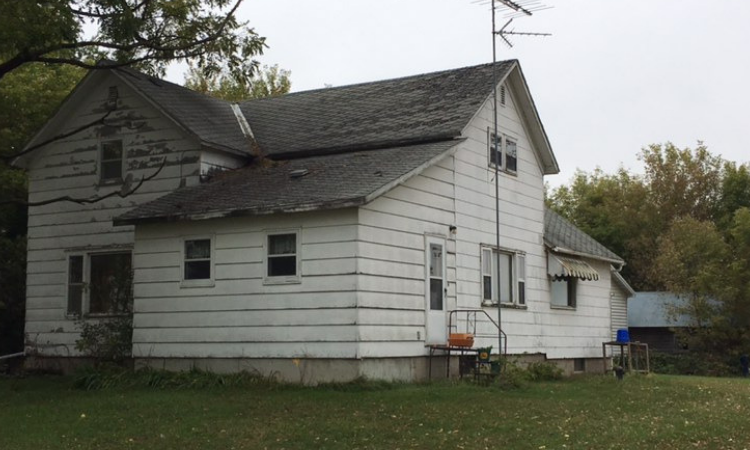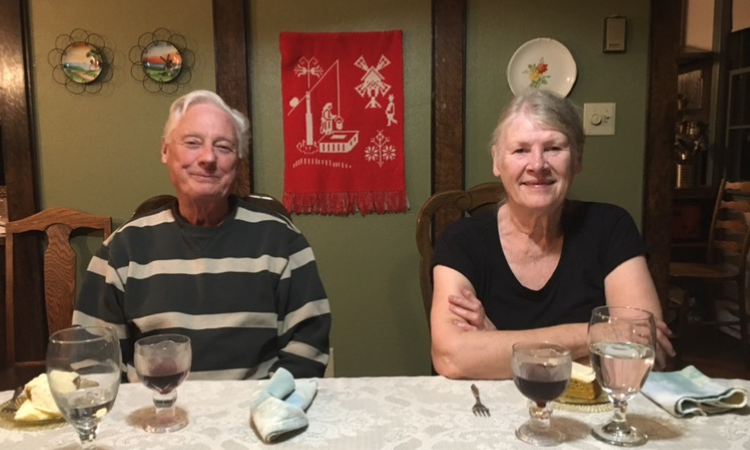
My mom and her family were blown out of their North Dakota home during the dust bowl days.
PAST. Present. And Future.
I’m on the road. Again. Marleen and I flew to visit our son in Omaha. But, because she’s not a fan of long road trips-and I still am-I rented a car and took a circuitous, sentimental journey back to Denver.
On the way, I listened to hours of recorded books: one of the pleasures of road trips for me. One was The Conservative Mind by Russell Kirk. The other was The Heart of the Matter, a novel by Englishman Graham Greene, considered by many to be one of the best writers of the 20th century. More later.
My first destination was the far south east corner of North Dakota. It’s where my mom grew up during the Great Depression in a small farm house with her parents and six siblings. The family was blown out during the Dust Bowl. After selling all they could at a farm auction, they headed to west to Yakima, Washington to work in the fruit orchards and canning factories. For some reason, the last two to leave North Dakota were my grand mother, Hazel, and the youngest daughter, Connie. They hitchhiked the 600 some miles from North Dakota to Yakima, Washington. Real Grapes of Wrath stuff.
The nearest towns to where my mom grew up are Lidgerwood and Wahpeton. My mom’s last remaining relative in the area, Clark Williams, was my gracious host and guide on what was a cool, grey day. Wikipedia characterizes Clark as one of the Wahpeton’s “notable people” because he represented the area for years in the state House. Not much older than I, his health isn’t good. While we were waiting for our hamburgers at Dee’s Bar & Grill in Lidgerwood, he stepped out the back door for a smoke-before coming back in to hook himself up to his oxygen tank. I was disappointed to learn that his side of the family seems fractured and that I wouldn’t be able to participate in a family reunion-because they don’t have them.
It wasn’t easy to tell if my mom’s old house hard by the Wild Rice River is still occupied; Clark thought it was. Brown William’s house, my grandma’s brother, was just around the corner. Although the house is no longer in our family, it still looked good with a fresh, grey tin roof.
The geography of the area is peculiar. Although it’s not far from the headwaters of the Mississippi in Minnesota, this flat, extremely fertile country is drained by the Red River that runs north to eventually drain into Canada’s Hudson Bay. As I drove north from Omaha on a dark night, it was disorienting for a Coloradan to see a road sign flash by telling me that I was crossing the Continental Divide hundreds of miles west of the Rockies.
The Past: Custom and Tradition.
In his frightening novel, Nineteen Eighty-Four, George Orwell depicts a world in which “Big Brother” manipulates everything, including history. An entire bureaucracy, the “Ministry of Truth,” is given over to rewriting the past to make it conform to the current party line-which changes from day to day. Inconvenient historical facts are consigned to the “memory hole.” The fickle nature of the past adds measurably to the hellish world that Orwell, drawing on the hellish world that Joseph Stalin had created in reality, depicted in his novel.
The antidote for the horror of Nineteen Eighty-Four and Stalin’s gulag? Russell Kirk’s 1953 tome, The Conservative Mind. The book-be prepared for a long one-surveys conservative thinkers and their ideas from Edmond Burke (1729-1797), an English politician and philosopher, to T.S. Eliot (1888-1965), the Nobel laureate author of what is perhaps the most famous of modern poems, The Love Song of J. Alfred Prufrock.
For a book that was written as a doctoral dissertation, The Conservative Mind is remarkable not just for the breadth and depth of its scholarly content. It also played an enormously influential role in reinvigorating conservatism when the movement had been almost entirely written off in the wake of what seemed the irrevocable triumph of New Deal liberalism. The book’s a “must read” for anyone who wants to understand the rise and meaning of modern conservatism.
It’s Burke that casts the longest shadow over the pages of The Conservative Mind. His extended essay, Reflections on the Revolution in France, profoundly influenced both the England of Burke’s day and the modern conservative movement. Written as a warning against the bloody excesses and turmoil of the revolution, Burke was not an advocate of putting society in a straight jacket. However, he believed that change in a healthy society should be evolutionary and guided by tradition and custom-or, as he put it in the language of his time, “prescription.” In so doing, society fulfills its obligation to generations past, present, and future.
Bonanza!
One of the early conservative statesmen that Kirk describes is John Adams. Founding Father, our first Vice President, second President, and rock ribbed New Englander, Adams sired a host of descendants. Including John Quincy Adams, the sixth President. Somewhere down the line, another John Quincy Adams came along who lived in Wheaton, Illinois, a suburb of Chicago.
In 1881, this particular Adams took advantage of cheap railroad land in the Dakota Territory to purchase 9,600 acres and gave it to his daughter and son-in-law as a wedding gift. It eventually became the Adams Fairview Bonanza Farm, about 15 miles from Wahpeton. Making the most of the flat, fertile land, Bonanza farmers put together armies of workers, mules, and capital to grow enormous quantities of mostly grain to feed the world’s rapidly expanding population. At one point, the Adams farm was a virtual small city, with bunk and mess houses, several barns, an office building, and a grain elevator at the end of a rail spur. There was a herd of 10,000 sheep.
Now, the original rambling farm house is now a lovely B&B; I stayed two nights in the master bedroom suite. One gray morning, to stretch my legs, I walked to the nearest section crossroad. It might not have been in the middle of nowhere, but I think I saw it somewhere out there beyond those fields that ran as flat as a table to the horizon.

John and Tuula Kube, my gracious hosts.
My gracious hosts, John and Tuula Kube, are, just like my mom’s family, good Scandahoovians. (They’re no relation to the original Adams family.) Great French toast and Swedish pancakes were served up for my two breakfasts. It goes without saying, slathered with plenty of butter. And, despite my having invited myself to dinner, a wonderful meal of local beef and steaming bowls of fresh vegetables out of their garden. While they don’t farm the place themselves anymore, they do rent it out to other local farmers. Their daughter and her family live just across the gravel road.
Was it an accident that I stayed in a bedroom in a house that had once been owned by a descendant of a man who’d played such an important role in our nation’s history? And whose story I’d been listening to? Probably. But it sure was a nice serendipity. And more than enough to slingshot me on to my next destination, far across those lonely plains, as John and Tuula shrank in my rear view mirror.




I am saving all your book suggestions! This is really informative too. I feel like I am being awakened to the treasure that are road trips. 4 Years in Seminar, 1 year in Korea, and almost 2 years in Indonesia, and now we live in the beautiful PNW, where there is so much beauty around us.
I am looking up Edmund Burke’s works right now….
wb
>
Will, Thanks for dropping by. Marleen and I are in Spokane this Thursday thru Saturday. Would you have time for coffee? Spencer
In my childhood in northwestern Illinois, I daily walked past dozens of homes just like the one pictured. Good, hard-working, honorable people inhabited those homes. Our nation’s heartland still flourishes, thank God, and its lessons enrich us profoundly.
Peg. Great to hear from you. Hope you and George are well. Thanks so much for stopping by the blog.